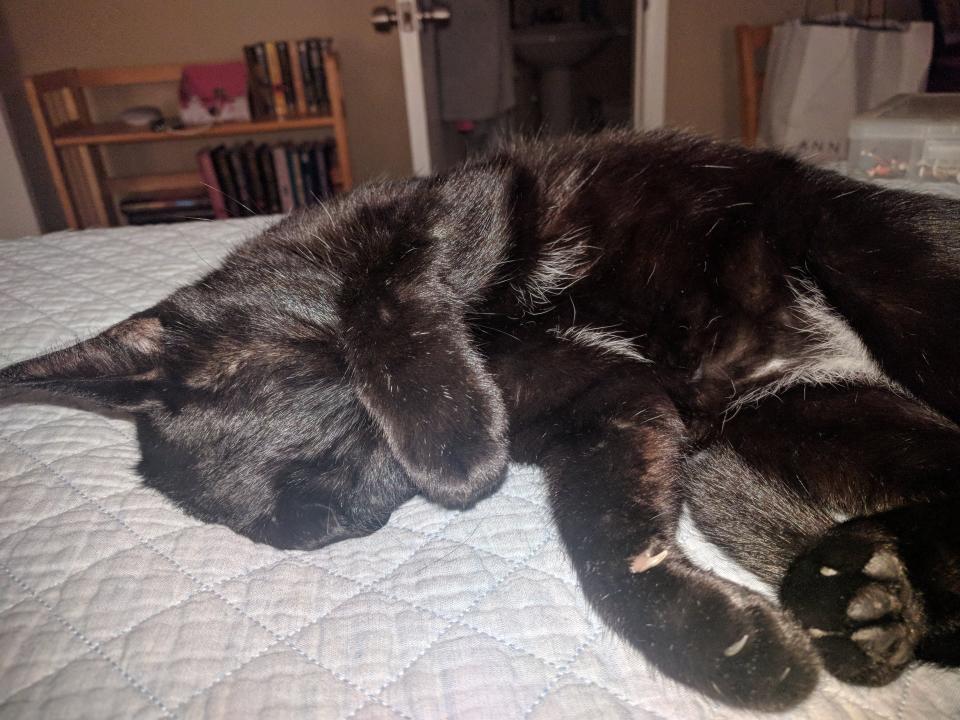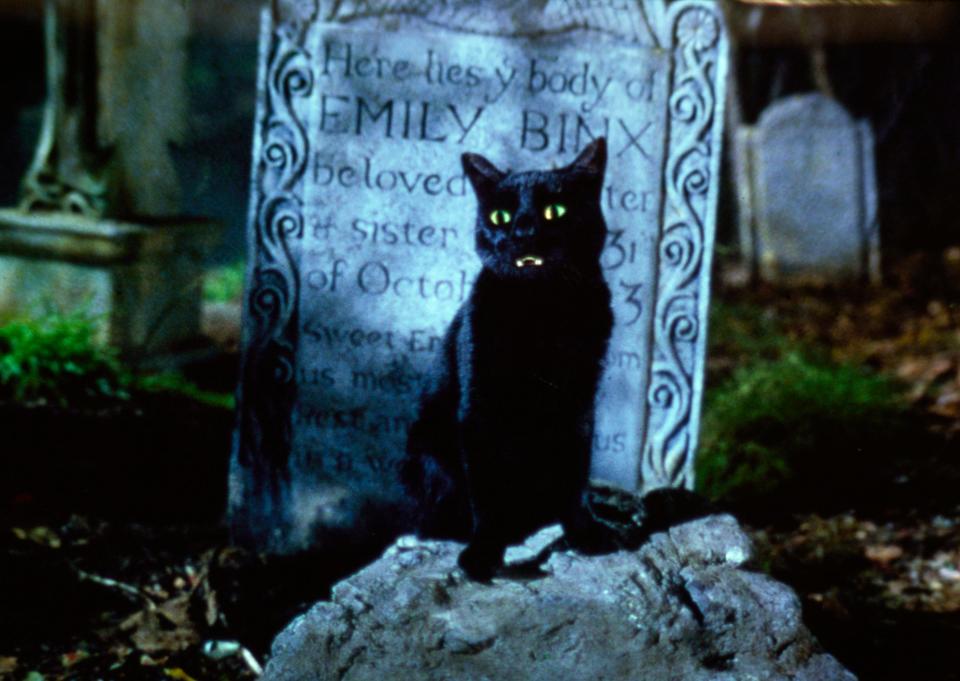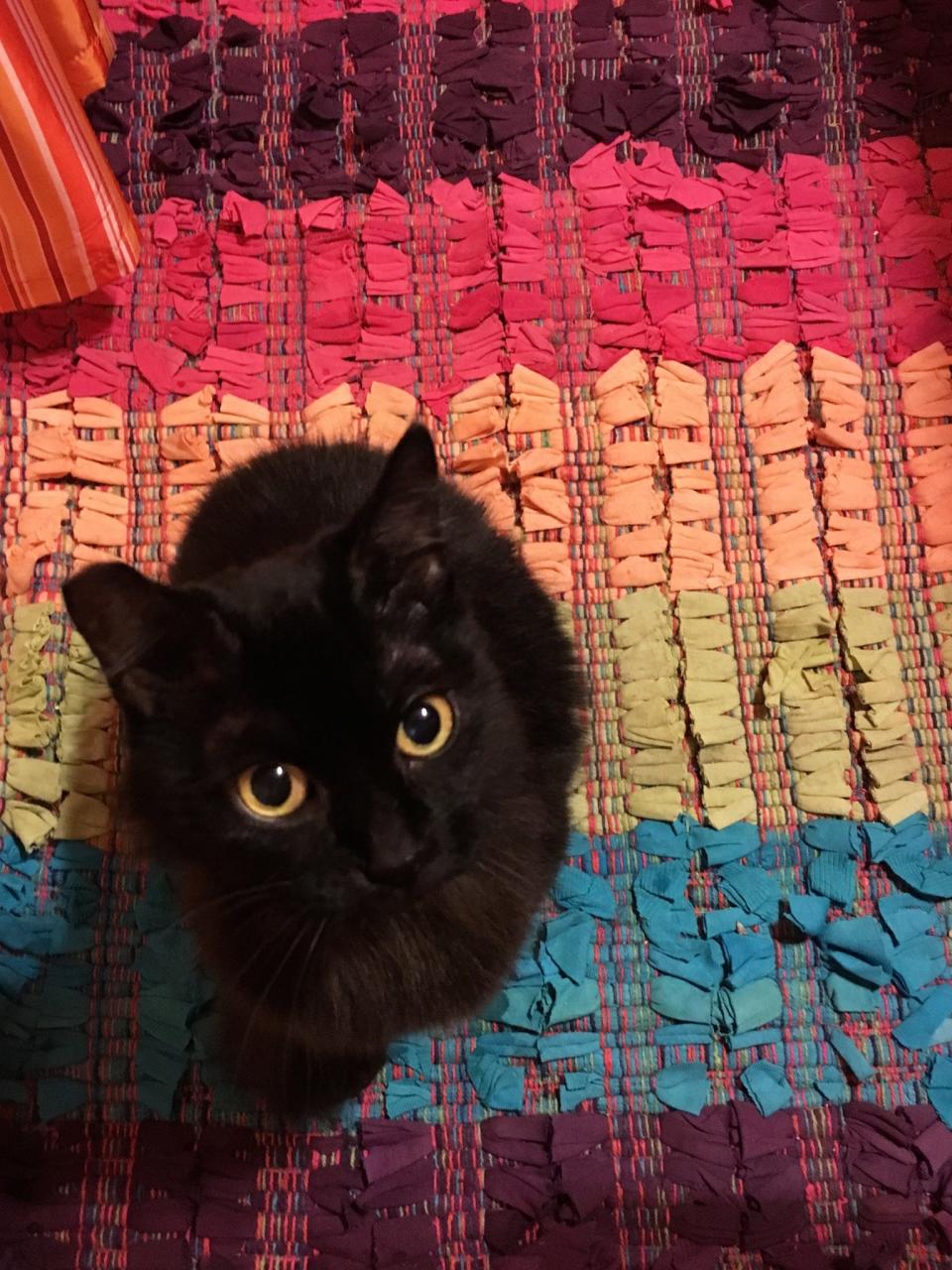Happy National Black Cat Appreciation Day! Here's everything to know about black cat myths
It's National Black Cat Appreciation Day! Time to honor your little house panthers and give them the extra treats they know they deserve.
This should not be confused with National Black Cat Day (Oct. 27), National Hug Your Cat Day (June 4), International Cat Day (Aug. 8), or even World Lion Day (Aug. 10). But can we ever honor our feline friends and adorable overlords too much?
Where National Black Cat Day is set aside just before Halloween to encourage more people to adopt black cats, National Black Cat Appreciation Day specifically sets out to dispel myths associated with the midnight creatures that have become spooky icons that symbolize Halloween.
They're evil. They're more bad-tempered. They associate with witches as familiars, and possibly Satan. They disappear at night, with only their eerie yellow, glowing eyes shining at you. They don't show up as well in selfies. And, in one of the oldest superstitions in Western civilization: black cats bring bad luck.
All untrue, as any black cat lover knows. Maybe the selfies one.
How did National Black Cat Appreciation Day get started?
Black cats were invented to give everyone the opportunity to be owned by a mini panther #BlackCatAppreciationDay pic.twitter.com/6diRzxKX6F
— Gladstone 🇺🇦 (@TreasuryMog) August 17, 2023
Animal lover and animal sanctuary volunteer Wayne H. Morris wanted to honor his sister June, and her own cat, which their father had initially refused to allow in the house because it was black. June passed away at age 33. Two months later, her beloved 20-year-old black cat Sinbad died.
To fight back against prejudice and ignorance about black cats, in 2011 Morris declared Aug. 17, the day June died, to be Black Cat Appreciation Day. He started a Facebook page, "For the Love of Black Cats (Black Cat Appreciation Page," and began promoting it online. It caught on.
Why do some people fear or hate black cats?

Cats have been in human households since ancient Egypt and Greece, where they were often revered as mythical creatures and divine symbols, according to the A&E network History, and Greeks associated cats with Hecate, goddess of magic, sorcery, the moon and witchcraft. Romans associated the cat as a symbol of Liberta, goddess of freedom.
In medieval Europe, the rise of witchcraft was associated with black cats, which got a boost from Pope Gregory IX's official church document "Vox in Rama." It was an official call against witchcraft and cults (and non-Catholic faiths) and was the first papal bull, or edict, to establish the cat as a creature of the devil and part of the cult's unholy rituals, which were described in detail. It named black cats specifically.
Historians say that kicked off a wave of abuse and killings of cats across Europe, especially black ones, to banish evil. The witch association myths grew — witches can turn into them! — as early Christian churches condemned them and Puritans brought the beliefs to the New World and eventually into modern pop culture.
Black cats are spooky looking, for many people. Tales that they can change color may be from the fact that some black cats can appear to be two colors at once due to a lighter skin color under the fur.
Do black cats bring bad luck?
Audrey Hepburn photographed by Walter Carone, London, 1951 #BlackCatAppreciationDay pic.twitter.com/eO0RmcM6Bn
— Audrey Hepburn (@SoAudreyHepburn) August 17, 2023
For many years black cats were considered by many people in Western countries to be bad luck because a black cat crossing your path might be on a mission from a witch, or might even be the devil himself.
“Many fearful peasants of the day might have hurried to the nearest church and paid for a priest to bless them and rid them of any curse that might have been laid by the cat,” Cerridwen Fallingstar, Wiccan priestess and author, told History. “As this was a source of income for the church, such fears would have likely been encouraged.”
That's not worldwide, though. In Japan, black cats are associated with the god Maneki Neko and are seen as good luck, especially for single women. In Scottish folklore, black cats are signs of prosperity and are associated with the goddess Brigid. Some Latvians believe that black cats around a farm mean good luck and plentiful harvests, and a sneezing black cat is a centuries-old sign of impending good luck in Italy. In Germany, it depends on which direction the cat is walking when it crosses your path (left to right is good).
#BlackCatAppreciationDay is 17 Aug. Black cats are amazing! In #Wales they bring good luck to the home as they chase all ills away” & in #Scotland if a black cat shows up at your front door, it is a sign that wealth is coming your way! #FolkloreThursday #CatsOfTwitter #Caturday pic.twitter.com/oNBJi75QOM
— Maude Frome (@frome_maude) August 17, 2023
A 2022 survey among 2,000 American cat owners by ACANA Pet Food and market research company OnePoll found that:
41% of respondents think black cats bring good luck
21% of participants think black cats bring bad luck
30% don't think black cats bring any kind of luck
8% aren't sure how they feel
There is no empirical evidence that cats, by their nature or color, bring any sort of luck.
How many black cats are there?
The Cat Fancier's Association recognizes 22 breeds of cat that can have solid black coats. One breed, the Bombay, consists solely of black cats.
The bodies of black cats produce a high amount of melanin which produces black fur and also tends to make their eyes yellow. Black cats also tend to be male.
Are black cats less likely to be adopted?
While widely reported, it's not necessarily true that black cats are less likely to be adopted, although it can be tough getting people to adopt them, according to Jennifer Stott, executive director and co-founder of the Black Cat Rescue in Somerville, Massachusetts. It's worse than that: she said they are more likely to be euthanized.
A 2020 study by the University of Louisville led by associate professor of sociology Robert Carini looked at cat coat colors and perceptions and found that cats with black coats did have some of the worst outcomes.
"They didn't have a much higher chance," but "it still is a statistically detectable, higher proportion of them ultimately being euthanized rather than adopted or transferred, which includes fostering," he said.
Do black cats face more danger at Halloween?

Despite (or because of) their iconic performances as Binx from "Hocus Pocus" or Salem from "Sabrina the Teenage Witch," black cats are abused around Halloween, people say. They get adopted to be used for satanic rituals and then get abandoned or killed.
"That's pure myth," Becky Robinson, president and founder of Alley Cat Allies, told USA TODAY. "It's just an old fear that black cats are going to be adopted by people with bad intentions."
How can I celebrate National Black Cat Appreciation Day?

Adopt a black cat.
Buy special treats or toys for your own black cat and spoil them. More than usual, I mean.
Share pictures of your black cat on social media with the hashtags #BlackCatAppreciationDay and #NationalBlackCatAppreciationDay
Saleen Martin, USA TODAY, contributed to this story.
This article originally appeared on The Daytona Beach News-Journal: National Black Cat Appreciation Day: The truth behind the myths

